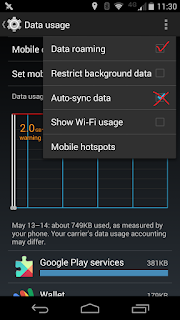Recently we bought something from Sears and used PayPal to pay for it. We selected to use a debit card as payment to PayPal. We thought that was relatively safe as Sears wouldn't have access to the debit card and could only process that one transaction.
How wrong we were.
My wife was subsequently balancing her checking account and saw several charges and debits against her checking account using the debit card via PayPal.
That was odd.
While the charges were acceptable (Sears had miscalculated the shipping) giving Sears the ability to process charges and debits against her checking account without our approval is
not what we had intended.
Looking back through the e-mail surrounding this transaction I found this e-mail from PayPal.
I don't remember that being obvious during the Sears/PayPal transaction.
And PayPal doesn't make it easy to find these agreements on their site.
Login to PayPal as normal.
Then up in the top right is a little gray gear. Click on that.
On the next screen scroll down to the bottom and find "Payment settings" and under that click on "Preapproved payments."
And there's Sears.
By the time I took the above screen capture I had canceled the agreement.
Click on the Merchant's name and you'll get this.
If the agreement is still active you'll be able to click on "Cancel" here.
I'm surprised at the merchants that do this. In my case I found payment agreements with Sears, TravelSmith, Orvis, eBay, Age of Learning, Office Depot, Zappos, iTunes, Ancestry.com, TigerDirect, GoDaddy, and Woot. Several on this list I used PayPal deliberately to deny the merchant unapproved access to my credit.
This verges on sneaky, both on the part of the merchant and PayPal.
And while I have your attention on PayPal, go read
this.









